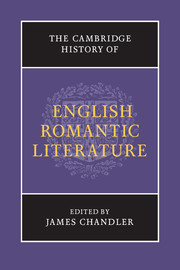Book contents
- Frontmatter
- Introduction
- Part I The Ends of Enlightenment
- Part II Geographies: The Scenes of Literary Life
- Part III Histories: Writing in the New Movements
- 15 Rebellion, revolution, reform: the transit of the intellectuals
- 16 Changes in the world of publishing
- 17 The new poetries
- 18 Romanticism and poetic autonomy
- 19 Transformations of the novel – I
- 20 Transformations of the novel – II
- 21 Theatre, performance and urban spectacle
- 22 The epigenesis of genre: new forms from old
- 23 The literature of the new sciences
- 24 The making of child readers
- Part IV The Ends of Romanticism
- Chronology
- Bibliographies
- Index
- 1 A New Pocket Map of the Cities of London and Westminster; with the Borough of Southwark, Comprehending the new Buildings and other Alterations, 3rd edn (London: William Faden, 1790).">
- References
22 - The epigenesis of genre: new forms from old
from Part III - Histories: Writing in the New Movements
Published online by Cambridge University Press: 28 May 2009
- Frontmatter
- Introduction
- Part I The Ends of Enlightenment
- Part II Geographies: The Scenes of Literary Life
- Part III Histories: Writing in the New Movements
- 15 Rebellion, revolution, reform: the transit of the intellectuals
- 16 Changes in the world of publishing
- 17 The new poetries
- 18 Romanticism and poetic autonomy
- 19 Transformations of the novel – I
- 20 Transformations of the novel – II
- 21 Theatre, performance and urban spectacle
- 22 The epigenesis of genre: new forms from old
- 23 The literature of the new sciences
- 24 The making of child readers
- Part IV The Ends of Romanticism
- Chronology
- Bibliographies
- Index
- 1 A New Pocket Map of the Cities of London and Westminster; with the Borough of Southwark, Comprehending the new Buildings and other Alterations, 3rd edn (London: William Faden, 1790).">
- References
Summary
Preliminaries
Discarding the ‘classical’ theory of genre, Friedrich Schlegel wrote provocatively that there is only one genre or as many genres as texts. Similar claims for the power of texts to create their own rules were made by William Wordsworth, Victor Hugo and Friedrich Schelling. The diversification of genres, the insistence at times that every text is sui generis, and the definition of poetry (by Percy Shelley for example) as a faculty not confined to literature, might suggest that the Romantics attached no value to literary genre. But Schlegel’s notion of a single genre – a progressive universal ‘poetry’ which he also called the ‘novel’ – and his insistence that we need a theory of genre, imply that genre remained important to a period that branched out from the ‘central genres’ to ‘extended literature’ and to a sense of literature itself as extending into and engaging with other cultural domains. I suggest here that genres imply an approach to aesthetic education. Thus the idea of a pre-established number (whether three or eight), and the arrangement of these kinds of subject-matter in a hierarchy, both subtend particular ways of disciplining the subject and constructing literature as a discipline. In this sense, the Romantics’ unfixing of genres or ‘kinds’ from the canonicity of lyric, drama and epic challenges the restriction of literature itself to certain ‘kinds’ of experience learned through apprenticeship to a curriculum of genres. Indeed the very shift from a formal theory of genre, and the blurring of the line between genre and mode, are part of this challenge.
Keywords
- Type
- Chapter
- Information
- The Cambridge History of English Romantic Literature , pp. 507 - 526Publisher: Cambridge University PressPrint publication year: 2009
References
- 2
- Cited by

